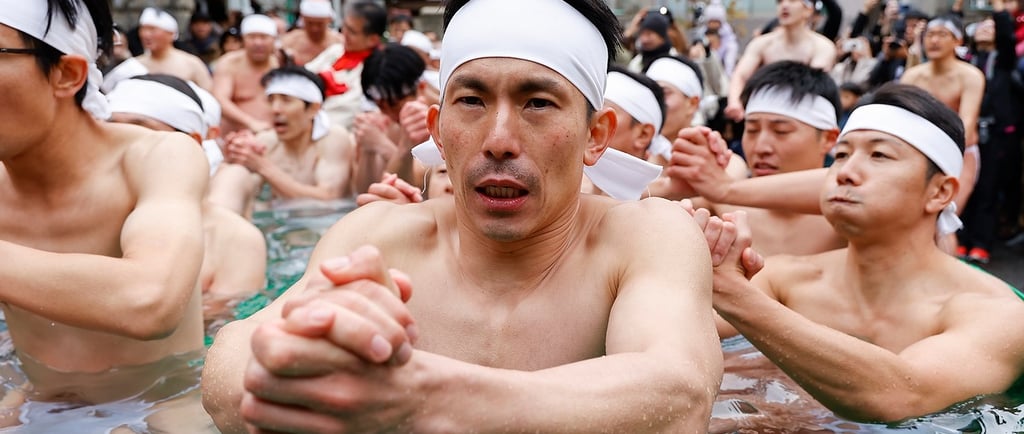The Japanese Tradition of Midwinter Ice-Water Bathing: A Ritual Purification for the New Year
Every year, brave participants joined the purification ritual to pray for a healthy new year.
ARTICLES
1/12/20254 min read


Introduction to Japanese January Rituals
The New Year, a time of intense traditions and rituals intended to bring about moral regeneration, is a considerable period in Japanese society in January. Midwinter ice-water cleaning is one of the significant ceremonies excreting that supports the Chinese tradition of making the body and spirit for the year back.
Shogatsu or Japanese New Year celebrations, are old customs that show a profound respect for character and the changing times. Many of these customs are intended to ward off misfortune and provide good fortune for the future, from the design of homes with sacred symbols to the performance of ritual ceremonies. The ice-water cleaning tradition, which involves submerging oneself in icy lakes during the coldest time of the year, is one of these rites. This practice demonstrates a determination to self-purification and registration as well as physical and mental fortitude.
Another festival that takes place in January includes getting in family groups, visiting temples and churches, and performing conventional ceremonies like "hatsumode", which involves the initial sanctuary visit of the year. These events are critical for fostering neighborhood bonds and stimulating reflection on one's own life. Additionally, the very essence of Chinese tradition purifications promotes consistency and ties to ancient traditions, allowing people to purify themselves of the past year and take new beginnings as the new year begins.
Shinto Purification Ceremonies: What Purifies Ice-Water Bathing?
In Japan's Shinto cleansing ceremonies, a significant portion of the population engages in the process of winter ice-water cleaning. These rites, which are essential components of religious well-being, emphasize the importance of cleanliness and regeneration. Midwinter has traditionally been a period of reflection and registration, making it a great time to conduct ritual filtration, which usually involves returning into direct contact with snowy lakes.
Individuals in these ceremonies take themselves deep in warm waters during the wintry harshest months, a process that is both comprehensive and revolutionary. The act of immersing oneself in icy waters symbolizes the removal of all erudition and ties, permitting a moral renewal. This habit is often practiced near rivers or other naturally occurring liquid resources, where it is believed to clean water. These sites are sacred sites where one feels the most deeply about nature and religion.
Ice-water cleaning had its origins in ancient Japan, where cleansing products were a part of festivals to respect the deity or spirits. These festivals evolved over the course of the generations into complex ceremonies, usual of modern Shinto traditions. Areas are gathered today to do these ceremony purifications, confirming their ethnic identity and developing a sense of unity. In today's world, where citizens seek regeneration in an ever-changing earth, ice-water cleaning has a considerable effect, and it continues to do so.
Individuals in their rites embrace the religious tenets of Shinto and create a deeper understanding of the natural elements that make up their social traditions by including ice-water cleaning as part of their rituals. This persistent history is a major part of Chinese cultural personality because of its deep connection to ritual, nature, and the quest for religious clarity.
A Test of Manhood: Enduring the Cold
In Japan, ice-water washing extends beyond just physical stamina to significant social ramifications that act as a rite of passage and manhood check. These events are generally viewed as a mark of strength and fortitude, where people easily recognize cold problems. This action embodies the characteristics that are valued in Chinese traditions, such as determination and strength, in addition to being a personal issue.
Mental and physical planning are required to join in ice-water soaking in the middle of the spring. Hot water can cause a lot of emotions, including screaming or breathing difficulties. Experts, who emphasize the value of intellectual fortitude, can overcome this intelligence through meditation and breathing techniques. This personal control, which enables individuals to face and overcome their fears, serves as a key component of change, raising their sense of masculinity.
Their value is more strengthened by the social nature of these rites. Organizations gather to boost one another's resolve as well as do ceremony purifications as a group. A strong sense of camaraderie emerges as respondents help one another through the first shock of the icy waters. This shared practice promotes companionship and mutual assistance among participants as well as personal power. Some people leave the ceremony of brotherhood feeling more like they have a solid sense of character, unification, and purpose, which shows how deeply their social participation in these traditional methods has impacted them.
In the end, spring ice-water washing serves as both a physical and psychological ritual, allowing members to see their possible, experience the terrible cold, and come with new strength and endurance, celebrating their masculinity as a testament to their masculinity.
The Spiritual Outcomes of Prayers for Good Health
The spring ice-water cleanup process, especially during New Year's Eve, is both a deeply spiritual and physical detoxification that includes needs for outstanding health. Respondents usually perform this service with the sincere intention of exfoliating both their system as well as their ideas and hearts. They worship in the white waters, striving for a time of wealth, health, and public well-being for both themselves and their communities.
Individuals express their desires through heartfelt goals in these ceremonies. Some folks think they can release the negative energies from the previous year and get new treasures into their life by taking part in midwinter-ice wet pools. During these periods, social bonds develop as people share their goals and challenges, fostering a sense of cohesion that enhances the groundbreaking nature of the process. The collective energy of these gifts often resonates beyond the unique, producing a supportive environment within the broader community.
Personal anecdotes from those who have taken part in these events show the strong religious advantages associated with them. People report feelings of rejuvenation and clarity after the winter rain, reinforcing their intentions to keep a healthy lifestyle moving forward. Some share stories of how these actions have instilled in them a greater appreciation for jobs and an increased desire to support individuals in their quest for health and happiness. Through these testimonies, it becomes clear that the process of meeting purifications in Japan, largely through winter ice-water washing, serves not just as a means for physical cleansing but also as a meaningful expression of hope and renewal that impacts individuals and their communities alike.
Midwinter Ice Water Bathing Ceremony 2025 – The Coldest Tradition!
Whether you’re a fan of unique traditions or curious about Japanese culture, this video has something for you. Don’t miss out on this incredible journey into the icy waters of Japan's midwinter!

